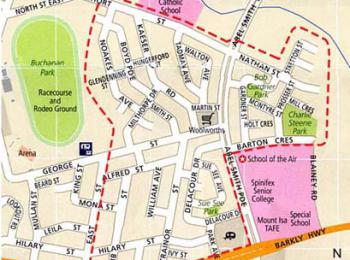
This IMYRP project proposal aims to explore the intersection between four broad variables. It is premised on the hypothesis that for positive outcomes, an intercultural recognition space is required involving mutual recognition of moral relationships of duty and care between (i) individual householders or tenants, (ii) community leaders and Elders (local governance structures), and (iii) government (including quasi-government and NGO) housing managers and policy administrators.
Two premises of the study are firstly that conditionality should be understood as the moral relationships of duty and care that occur within and between individuals, communities and the state, and secondly, in understanding how conditionality impacts on Indigenous housing outcomes, processes of inter-cultural recognition and misrecognition are critical to examine.
Figure: The suburb of Pioneer in Mt Isa. Red dotted line indicates the Pioneer housing precinct which contains a high density of public rental stock.